States Fight Plastics Crisis in Court
Air Date: Week of January 10, 2025
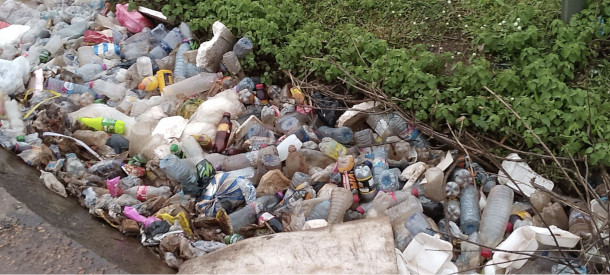
Some states are suing brands by claiming their products create a public nuisance. (Photo: Deishini Mariam, Wikimedia Commons, CC0)
With a global plastics treaty delayed and federal action to stem the plastics crisis unlikely in the near future, states and cities are turning to the courts for remedies. Bethany Davis Noll teaches at NYU law school and joined Living on Earth’s Paloma Beltran to explain the potential impact of these lawsuits against fossil fuel companies and beverage makers.
Transcript
CURWOOD: At the end of 2024, negotiations to create a global plastics treaty were suspended until mid 2025 after nations failed to reach a consensus. Meanwhile a tidal wave of plastic production just keeps on surging forward. And in the US, the incoming Trump administration has promised to roll back many environmental regulations intended to support national solutions to the plastics crisis. But many cities and states in the US are not waiting for federal and international action on plastic pollution and are seeking remedies in the courts. Bethany Davis Noll teaches at NYU law school and tracks plastics litigation. She joined Living on Earth’s Paloma Beltran.
BELTRAN: So let's talk about some of the state-level lawsuits that are trying to tackle plastic pollution. What are some of the major cases to watch, and what kinds of legal arguments are they using here?
DAVIS NOLL: There's a category of cases that has to do with public nuisance, where we've seen counties and states bring claims against like a brand for creating a public nuisance. And what that generally means is, under public nuisance law, if somebody has harmed your health or your safety or your property in a way that creates a public nuisance, you can sue under these state common law doctrines. So New York State brought one of those. They've sued Pepsi. And then there's two pending at the county level in LA County and Ford County. And those basically allege that plastic pollution has harmed people's enjoyment of the environment and harmed their health. That's public nuisance. That's a state level claim. There's also deceptive practices claims. So what I mean by that is states have been suing different manufacturers for having lied to us about their products. And in that bucket, there's two different kinds of cases. One category of case I'd call greenwashing, and in that one, you see states suing brands for having claimed something about their product that's not true. You know, for example, there are two cases, one out of Connecticut and one out of Minnesota, where they sued Hefty for these bags that Hefty said were recycling bags, but really aren't, they really, actually gum up the works at the recycling facility. So those are green washing cases. The bag says recycling, and that's not true. That's what the argument is. Then there's another category of case, which is exemplified by California's recent lawsuit against Exxon. And that case is about Exxon having allegedly engaged in lying about plastics recyclability, having promoted recycling and advanced recycling as a solution for years and years. I mean, those are three big categories of cases that states are bringing: greenwashing, deceptive practices, and then public nuisance.
BELTRAN: Now Bethany, we know that exposure to microplastics and the chemicals that are used in plastics increases the risk of a wide range of health issues, from cancer to infertility. So to what extent are those health harms being used as legal grounds to go after these companies? You know, how hard is it to make that connection?
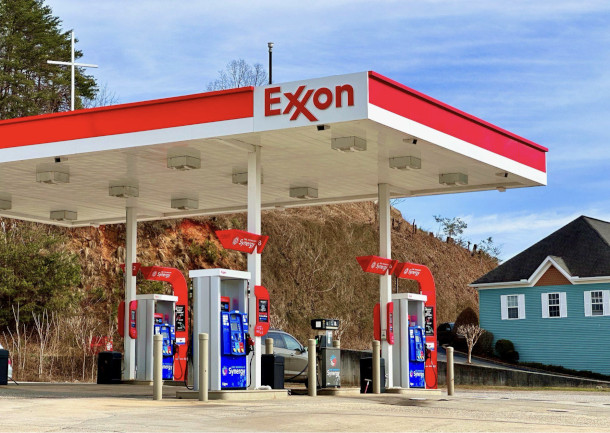
The State of California under the direction of Attorney General Rob Bonta has sued Exxon, alleging the company misled the public by promoting what it calls “advanced” recycling as a viable solution to the plastics crisis. (Photo: Harrison Keely, via Wikimedia Commons, CC BY 4.0)
DAVIS NOLL: Yeah, I've noticed that the health harms are coming up in case after case. Starting in 2018, we looked at the cases in a tracker that we keep at NYU, and they've, the health harms have been coming up. It's not yet the case that it's the basis of a claim, you know, you harmed me with this toxic pollutant when I ate it, or something like that, something direct. But the health harms are being raised in these cases, and there's a lot of toxins that are part of the additives that gets added to the plastic that's being made. So all plastic is a polymer, and then there's an additive, and the additive is often something where we know a lot about it, like we know that thing, if we put it in our bodies, is toxic, and so we have a lot of information about the toxins that are part of plastic. But the problem is, when it becomes a micro plastic and we start eating it, unintentionally, obviously, it's broken down, and you don't know exactly which toxin or how many you consumed, and so it's harder to test. And so we just don't have sort of the really precise testing that you normally have when you're testing PFAS, for example, on PFAS' impact on somebody's body. But the evidence is coming out more and more.
BELTRAN: What do you see as the strongest legal strategy here? You know, what cases might have the potential to really set a precedent for challenging the plastic industry?
DAVIS NOLL: Well, there's a lot of strategies that I think are at play that all have different strengths. And one that I just wanted to highlight was sort of this state level claim about unfair and deceptive practices. And something to just note there is that every state has one of these laws that outlaws unfair and deceptive practices and basically tells companies not to lie to us. And they're really strong. They basically give state AGs a lot of power to go after these practices. Like, for example, Connecticut's Unfair and Deceptive Practices Act is really strong. It also has the potential for really significant damages. So it's a strong tool, and it's something to pay attention to as state AGs start using that tool on this issue.
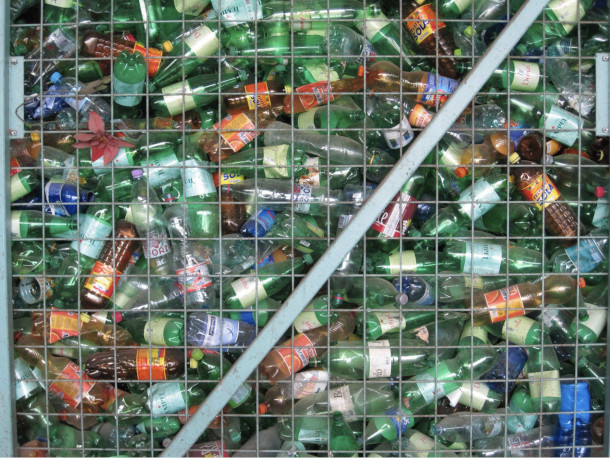
Plastic contains many chemicals that have been linked to a wide range of health issues, from infertility to cancer. (Photo: Radulf del Maresme, Wikimedia Commons, CC BY-SA 4.0)
BELTRAN: To what extent has this kind of state litigation against big companies been successful in the past?
DAVIS NOLL: You know, one thing that's happened over time when we face a problem like this as a country is we've seen states and state AGs step up and try to do something about it. They have a variety of powers that include lawsuits, that include litigation, that include the bully pulpit, where they could send a letter, you know, asking a company to explain its practices, and that might be enough to change corporate behavior. They can do public education, they can just use a wide range of tools to address a problem, and we've seen them now start acting on this question of plastics. And what's happened in the past is we've seen that make a difference nationally. So for example, like the famous story is tobacco, right? So tobacco was, there were health harms that people were suffering from, and what they were facing was, you know, lies about how it wasn't harmful, how it didn't hurt our health. And also, you know, the marketing to teenagers and kids and so on. And there were attempts in Congress that were failing, there were also private plaintiffs who were bringing lawsuits. Those were not going well. And then eventually the state AGs started to sue, and that's when things turned around. And those were the first thing that found success against the tobacco industry. And after you saw these State AG lawsuits start, we got a huge settlement, we got change in the industry, and we got action out of Congress to face these harmful impacts and to face the lies and to stop it. So that's what I think we're at the beginning of here with plastics.
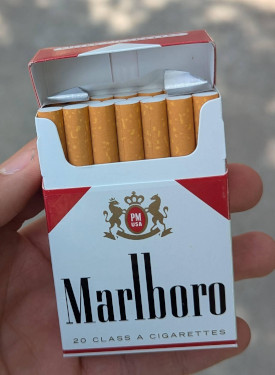
Lawsuits brought forward by state Attorneys General helped hold the tobacco industry accountable for its deceptive practices. (Photo: AnonymousEditor95, Wikimedia Commons, CC BY 4.0)
BELTRAN: Now besides litigation, states can also turn to legislation for action. What are examples of laws that states have been able to pass to curb plastic pollution?
DAVIS NOLL: Yeah, another big area that states are looking at in order to curb pollution is a category of legislation that's called extended producer responsibility laws, and those basically require the producer of the product to put money into recovering it and recycling it. Extended producer responsibility laws can be very useful for making sure that producers internalize the cost of the waste that you know you and I would otherwise bear. And those have been passed in Maine, Minnesota, California, and there's one pending in New York that's a really great example of what these should and can look like, and it'll be debated again in the next legislative session with which starts in January.
BELTRAN: So many of the lawsuits that we've discussed focus mostly on waste management. How much of a difference can these cases make in facing the root of the plastic crisis?
DAVIS NOLL: Yeah. I mean, I think the root of the plastics problem is production. We have enough plastic in this country. We don't need more of it, and the production facilities are harming, in really extreme ways, the people who live next door. So another category of case that's happening a lot is sort of frontline advocates challenging the production of plastic, of petrochemicals. And those cases are about the impacts of those facilities on the neighbors, and that has to do with the air pollution, that has to do with the toxins that come right out of the plant and land on the people that live nearby, and those have really well known cancer causing harms, those toxins, and the cases are about, you know that plant shouldn't be permitted because it's going to cause an additional burden on me as a community member, or you didn't analyze the impacts of this facility on the water adequately. There's a whole bunch of permitting fights that have been happening in Louisiana and elsewhere over these plants.
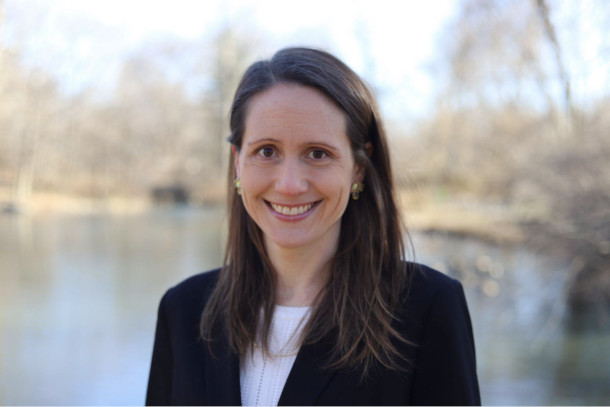
Bethany Davis Noll is Executive Director of the State Energy and Environmental Impact Center at the NYU School of Law and an adjunct professor at NYU. She also runs the NYU Plastics Litigation Tracker. (Photo: Courtesy of Bethany Davis Noll)
BELTRAN: And before you go Bethany, if these lawsuits do ultimately move forward, what will the consequences be for plastic producing companies nationally and internationally?
DAVIS NOLL: I guess, if the lawsuits move forward, and there's such a variety of lawsuits that I think we can count on them moving forward, the companies will have to start really taking seriously what they tell us about, what's recyclable, what isn't recyclable, I can see them starting to invest in programs that use less toxic materials to make plastic. You know, there are some things that we need that are plastic, and we could make those things with fewer toxic materials or non-toxic materials. That is something that we know how to do. So I can see companies start investing in that. It's a business opportunity for them to invest in that and into reuse programs. So I can see, you know, the more accountability and the more truth that we can get out of the industry, the more we'll see them invest in things that really are safer for us, and I can see that happening as a result of the pressure from these lawsuits.
CURWOOD: That’s Bethany Davis Noll, Executive Director of the State Energy and Environmental Impact Center at the NYU School of Law, speaking with Living on Earth’s Paloma Beltran. ExxonMobil is now pushing back with a lawsuit of its own against the California Attorney General and a coalition of environmental groups, alleging that their legal action is a “smear campaign.” Exxon is also using the countersuit to double down on its so-called advanced recycling claims. A statement by Exxon is on the Living on Earth website, LOE.org.
Links
NYU Plastics Litigation Tracker
California Globe story about EXXON suing California AG and NGOs for defamation regarding plastics
Reuters | “PepsiCo Beats New York State’s Lawsuit Over Plastic Pollution”
Living on Earth wants to hear from you!
Living on Earth
62 Calef Highway, Suite 212
Lee, NH 03861
Telephone: 617-287-4121
E-mail: comments@loe.org
Newsletter [Click here]
Donate to Living on Earth!
Living on Earth is an independent media program and relies entirely on contributions from listeners and institutions supporting public service. Please donate now to preserve an independent environmental voice.
NewsletterLiving on Earth offers a weekly delivery of the show's rundown to your mailbox. Sign up for our newsletter today!
 Sailors For The Sea: Be the change you want to sea.
Sailors For The Sea: Be the change you want to sea.
 The Grantham Foundation for the Protection of the Environment: Committed to protecting and improving the health of the global environment.
The Grantham Foundation for the Protection of the Environment: Committed to protecting and improving the health of the global environment.
 Contribute to Living on Earth and receive, as our gift to you, an archival print of one of Mark Seth Lender's extraordinary wildlife photographs. Follow the link to see Mark's current collection of photographs.
Contribute to Living on Earth and receive, as our gift to you, an archival print of one of Mark Seth Lender's extraordinary wildlife photographs. Follow the link to see Mark's current collection of photographs.
 Buy a signed copy of Mark Seth Lender's book Smeagull the Seagull & support Living on Earth
Buy a signed copy of Mark Seth Lender's book Smeagull the Seagull & support Living on Earth

